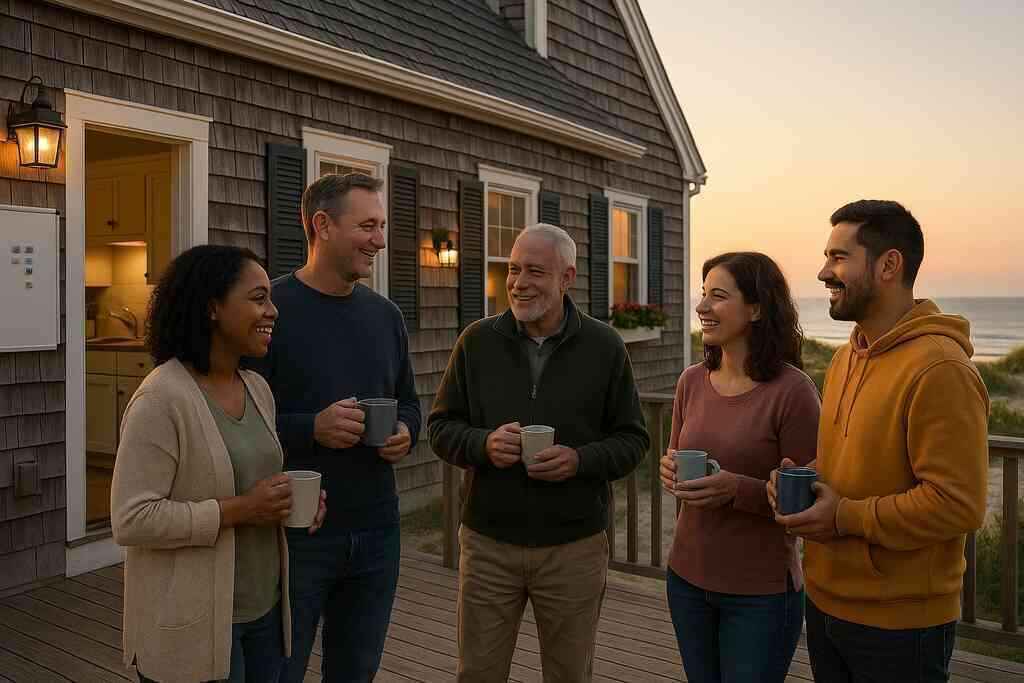
What Are the Hidden Benefits of Sober Living in Massachusetts
November 26, 2025
Surfacing Hope in the Bay State
Why Top Sober House Massachusetts is More Than a Directory
Many seekers assume a directory merely lists addresses. Top Sober House Massachusetts proves that assumption outdated and limiting. The platform curates data, personal stories, and experiential ratings for Massachusetts sober living options. This vetted intelligence helps families compare house rules, peer support, and relapse prevention lifestyle features. The hidden benefit is reduced research fatigue during an already stressful recovery crossroads.
Beyond listings, Top Sober House Massachusetts offers a human touch through phone consultation and live chat guidance. Recovery advisors describe neighborhood safety, transportation options, and local employers that often welcome residents of sober living homes. Such insider context empowers patients to envision structured routines for recovery before committing financially. It also shortens the decision window between inpatient treatment discharge and arrival at supportive environment housing. Timely placement dramatically lowers relapse risk, a silent yet potent advantage.
From Cape Cod to the Berkshires: The Landscape of Recovery Residences
Massachusetts geography might appear compact, yet recovery culture varies from seaside villages to mountain towns. Top Sober House maps this diversity through detailed profiles of recovery residences in Massachusetts. Coastal Cape Cod sober homes often weave beach walks and mindfulness trails into daily routine. Conversely, Berkshire’s group homes integrate hiking therapy and art workshops, fostering holistic wellness offerings. Knowing these lifestyle differences helps individuals align sober environment choice with personal motivation triggers.
Southeastern residents sometimes prefer proximity to family while maintaining boundary lines that support early recovery. Top Sober House lists sober housing near the Rhode Island coast, offering commuter rail access back to Boston employment hubs. This strategic location grants ocean air wellness benefits without sacrificing metropolitan medical follow-up. Communities collaborate with outpatient program clinics in nearby Providence, expanding the treatment continuum. Such coordination underlines Massachusetts’ commitment to community-based recovery resources across state lines.
Transitioning From Rehab Centers to Drug-Free Housing
The leap from clinical rehabilitation concepts to everyday living often feels daunting and disorienting. Structured sober living eases this gap by offering curfews, chore charts, and mandatory meetings mirroring treatment programs. Residents enter dwellings vetted for safe environments for sobriety goals. Each house manager reinforces accountability and administers drug testing, ensuring drug-free housing advantages remain intact. Daily structure reduces decision fatigue, a frequent relapse precursor identified by addiction specialists statewide.
Integration with community-based peer support accelerates confidence during vulnerable post-rehab months. House managers often supply printouts from the AA meeting locator near me so newcomers never feel isolated. Carpools to 12-step meetings promote service work and expand sober social networks beyond household walls. By practicing accountability in small groups, residents rehearse communication skills vital for family reintegration support later. Over time their daily routine becomes internalized, creating long-term sobriety habits that outlast program graduation.

The Unseen Architecture of Massachusetts Sober Living
Structured Routine for Recovery: The Massachusetts Blueprint
Massachusetts sober living houses pivot around an intentional daily rhythm that feels both firm and inspiring. Residents wake at consistent hours, complete chores, and attend morning meditation before employment searches begin. This cadence, often called a structured routine for recovery, stabilizes neurotransmitter cycles disrupted by prolonged alcohol abuse. Research shows predictable schedules lower anxiety, a leading relapse trigger during early recovery. House managers use digital calendars, shared meals, and room walk-throughs to maintain uniform standards. That dependable structure underpins transforming recovery in the Bay State for hundreds each year.
Clinicians at Boston rehab centers emphasize immediate placement into a sober living environment once inpatient treatment ends. The Massachusetts blueprint therefore schedules curfew orientation on day one, eliminating idle evening hours notorious for cravings. Residents complete chore charts reviewed weekly, building executive functioning that years of substance use disorder had eroded. Over time, the mundane practice of making beds and logging food budgets becomes muscle memory supporting long-term sobriety. Top Sober House staff routinely hear alumni say the simple act of making coffee at dawn now signals personal progress better than any therapy worksheet.
House Manager Accountability and Daily Habit Reinforcement
Every Massachusetts sober house relies on a trained house manager who lives onsite and models recovery behaviors. This role blends mentorship with firm oversight, ensuring residents follow clear house rules without losing dignity. Random drug testing, incident reports, and nightly check-ins create measurable accountability that typical apartments lack. The process converts abstract recovery promises into observable daily habit reinforcement. Residents notice that someone cares enough to ask about their meeting attendance, a subtle yet powerful deterrent against relapse.
House manager accountability also feeds quantitative dashboards that many operators now maintain. These dashboards track employment obtained, class credits earned, and consistent curfew adherence. Such data aligns with measuring sober success today in MA guidelines that insurers increasingly request. By translating personal victories into metrics, managers help residents appreciate incremental growth during frustrating plateaus. Numbers create proof that daily effort matters, nurturing confidence essential for sustaining a sober lifestyle.
Peer Support Networks MA and 12 Step Meeting Access
Structured housing alone cannot replace the emotional depth of human connection, and Massachusetts understands that lesson deeply. Peer support networks MA blossom within kitchen conversations, shared rides, and weekend service projects. Residents range from college students to retirees, offering diverse perspectives on overcoming alcohol addiction and drug abuse. Those daily micro-interactions teach conflict resolution and empathy, skills often underdeveloped during active substance use. By living alongside others who mirror their aspirations, newcomers internalize the belief that long-term sobriety is attainable.
Formal recovery meetings reinforce that hope. Most houses schedule carpools to Alcoholics Anonymous, SMART Recovery, and Narcotics Anonymous before residents even unpack. Updated NA meeting schedules in my area hang on common-room corkboards, removing procrastination barriers. The combination of in-house camaraderie and external twelve-step programs creates a layered safety net. When one support layer fails, another catches residents before a slip becomes a spiral.
Safe Environment for Sobriety and Relapse Prevention Lifestyle
Massachusetts certification standards require sober living houses to maintain clearly defined drug-free policies and secure premises. Locked medication safes, visitor sign-in sheets, and security cameras create a safe environment for sobriety that parallels hospital policies. Such safeguards prevent contraband entry and minimize triggers for residents battling substance use disorder. The predictable physical space empowers the brain healing from overstimulation to relax and focus on recovery. Feeling safe allows residents to explore therapeutic vulnerability without scanning the room for threat.
Relapse prevention lifestyle training extends beyond bricks and mortar. House meetings dissect high-risk scenarios like holiday gatherings or sudden job loss. Residents role-play responses, refine coping statements, and schedule emergency phone trees. Over time, these rehearsals move from conscious strategy to automatic response, much like fastening a seatbelt. That muscle memory dramatically reduces relapse probabilities once residents transition to independent housing.
Holistic Wellness Offerings: Yoga Ocean Air and Mindfulness Trails
New England’s varied landscape gives Massachusetts sober homes a wellness canvas few regions can rival. Cape Cod properties schedule sunrise beach walks that harness negative ions and uplifting ocean air. Inland houses near Worcester organize yoga classes in converted barns, blending physical movement with mindful breathing. Berkshire operators partner with local parks to offer mindfulness trails, encouraging residents to journal beside waterfalls. These holistic offerings complement clinical therapy by healing the body, mind, and spirit simultaneously.
Engagement in nature also supports neuroplasticity, the brain’s ability to form new connections damaged by alcohol abuse. Research shows moderate aerobic activity increases dopamine receptor availability, improving mood regulation in early recovery. When residents practice sun salutations or hike leaf-peeping trails, they anchor sobriety memories to positive sensory experiences. Those neural associations serve as relapse shields during future stress. The result is a grounded, energized individual ready to contribute to community and family life.
Academic and Career Bridges Sober Housing Near Universities and Employers
Boston’s concentration of universities and biotech firms presents unique opportunities for residents eager to rebuild careers. Many sober living houses partner with local employers who value punctual, motivated workers. Resume workshops, mock interviews, and transportation assistance help residents convert recovery discipline into job readiness. Some homes coordinate GED tutoring or community college enrollment, closing educational gaps that substance use once widened. This academic and career emphasis transforms a safe place into a launchpad for lifelong prosperity.
Proximity matters when balancing night classes, outpatient program attendance, and curfews. Houses near MBTA lines allow residents to reach campuses without sacrificing accountability. The Top Sober House guide for choosing your sober path in Massachusetts highlights dwellings within walking distance of major universities. Such logistical foresight reduces missed classes and frustrated withdrawals. Education becomes another pillar holding up the architecture of sustainable sobriety.
Community-Based Recovery Resources and Outpatient Program Proximity
Massachusetts boasts a dense network of outpatient clinics, counseling centers, and medication-assisted treatment programs. Sober housing clustered near these services streamlines the recovery journey by minimizing commute time. Quick access encourages consistent attendance, critical when therapy topics feel uncomfortable. When transportation barriers disappear, excuses dissolve, and momentum builds. Residents learn to view professional help as an integrated part of their weekly routine rather than an optional add-on.
Community resources extend beyond healthcare. Local libraries host mindfulness workshops, while civic groups invite residents to volunteer at food banks. These engagements provide purpose, expand sober social circles, and accumulate resume experience. Integration into civic life counters the isolation often accompanying early sobriety. The result is a reciprocal relationship where communities benefit from revitalized citizens, and residents gain identity outside their addiction narrative.
Cost Effective Recovery Housing and Hidden Financial Advantages
Sticker shock from inpatient treatment can leave families wary of additional expenses, yet Massachusetts sober living often proves cost effective. Shared utilities, bulk food purchasing, and sliding-scale rent keep weekly fees manageable. Residents also learn budgeting skills through mandatory finance workshops, turning overhead costs into educational investment. Compared to the price of a single relapse and potential re-admission, sober housing offers outstanding value. Insurance carriers increasingly recognize these savings and sometimes reimburse portions of program fees.
Financial advantages stretch beyond immediate price tags. The structured routine for recovery reduces work absenteeism, raising earning potential. Stable addresses allow residents to qualify for credit cards, auto loans, or student aid previously out of reach. Many group homes negotiate gym discounts and public transit passes, multiplying every dollar. Over twelve months, the cumulative savings rival what some spent during active addiction, proving sobriety can be both enriching and economical.

Beyond Early Recovery: Crafting a Commonwealth of Lifelong Sobriety
Alumni Networks and Long Term Peer Mentor Momentum
Graduation from a sober living program is a milestone, yet community bonds must keep growing after move-out day. Leaving a structured routine for recovery does not mean leaving the Top Sober House Massachusetts community behind. Alumni councils schedule monthly brunches, virtual check-ins, and career panels that reinforce the hidden benefits of sober living. These events allow recent residents of sober living homes to witness long-term sobriety modeled by peers who once shared bunkrooms. Seeing familiar faces thriving at five years sober ignites fresh motivation when personal routines feel monotonous.
Momentum also expands across New England borders. Many alumni organize joint retreats with the inspiring Vermont recovery community housing network, blending mentorship with mountain mindfulness. Veteran mentors facilitate goal-setting circles, while newcomers practice vulnerability outside daily house rules. Cross-state gatherings turn peer support networks MA into a regional force, offering ride shares to conferences and shared scholarship funds. The cooperative spirit illustrates how small acts of service compound into lifelong accountability. Alumni realize their voice carries weight, encouraging consistent meeting attendance and active sponsorship roles.
Recovery Friendly Social Activities from Fenway to Freedom Trail
Sober fun matters because boredom often precedes relapse for people in early recovery. Boston’s recovery-friendly calendar makes choosing activities as simple as scanning an app. From Fenway Park’s yearly “dry night” to Freedom Trail walking tours led by history-loving alumni, options flourish every weekend. Organized outings replace old bar circuits with sports, culture, and laughter, proving that alcohol abuse is not required for meaningful connection. Residents learn to navigate crowded events, decline offered drinks gracefully, and focus on shared experiences rather than substances.
Smaller towns echo the same energy. Cape Cod hosts sunrise shell-collecting meetups, while Worcester coffeehouses run open-mic poetry nights specifically for those in outpatient programs. House managers encourage attendance because every ticket purchased demonstrates self-care and social courage. Support groups often volunteer as ushers or greeters, turning recreation into service work that deepens gratitude. These gatherings strengthen sober environment habits by teaching residents to schedule joy alongside chores.
Building Generational Change Family Reintegration Support
Addiction rarely affects one individual alone; entire families absorb the shockwaves. Massachusetts sober homes therefore partner with licensed therapists to host quarterly family reintegration workshops. Parents, spouses, and children practice communication scripts that defuse tension and nurture empathy. Learning to replace blame with open-ended questions resets household dynamics damaged by substance use disorder. When families witness consistent curfew adherence and employment stability, trust begins to rebuild naturally.
Specialized tracks address unique needs, including a supportive environment for women recovering from trauma and young adult sober living MA focused on collegiate stressors. Workshops teach relatives how to spot subtle relapse cues without becoming surveillance officers. Sessions also review house rules so expectations remain consistent across living spaces. Over time, family systems shift from crisis management to a growth mindset, ensuring generational change rather than temporary cease-fires. The ripple effect boosts community resilience far beyond any single residence’s walls.
Mapping Your Next Step: Choosing a Top Sober House Near You
Even with knowledge in hand, choosing a sober house near me can feel overwhelming during emotional transition weeks. Top Sober House simplifies the decision with interactive maps, transparent pricing, and verified resident reviews. Filters highlight halfway houses offering employment assistance, mental health resources, or gender-specific dorms. By comparing amenities quickly, prospective residents conserve energy better spent on outpatient therapy or job searches. Informed choices reduce buyer’s remorse and strengthen commitment on move-in day.
After selection, advisors coach applicants through paperwork, insurance questions, and transportation logistics. They also explain neighboring support options, such as drug-free homes in New Hampshire or Boston halfway houses for commuting students, helping families plan long-term contingencies. This consultative approach underscores the platform’s mission: transform research fatigue into hopeful clarity. When people finally place keys into a new room door, they carry confidence, community, and a roadmap toward lasting health. Those advantages confirm why a top sober house near you becomes more than shelter-it becomes a springboard toward thriving citizenship.
Frequently Asked Questions
Question: How does Top Sober House Massachusetts cut through research fatigue when families compare sober living houses across the Bay State?
Answer: Our directory goes far beyond a static list of addresses. Every listing for sober living in Massachusetts includes resident-verified house rules, relapse prevention features, neighborhood safety notes, and even commuting options to Boston rehab centers or Cape Cod outpatient clinics. You can filter for women-only group homes, young-adult programs, or Boston halfway houses that specialize in employment assistance. Because all data are pre-vetted by recovery advisors and backed by live chat support-families quickly find a safe place that fits both budget and clinical needs, slashing days (sometimes weeks) off the decision timeline.
Question: What are the hidden benefits of sober living in Massachusetts highlighted in the blog What Are the Hidden Benefits of Sober Living in Massachusetts?
Answer: The blog reveals perks many people overlook: structured routine for recovery that resets circadian rhythms; house manager accountability that transforms promises into daily habit reinforcement; peer support networks MA that expand beyond household walls into statewide 12-step meetings; and holistic wellness like yoga barns in Worcester or mindfulness trails in the Berkshires. Top Sober House Massachusetts captures all of these advantages in one place, so you can see why a drug-free roof is only the starting point of long-term sobriety.
Question: How do structured routines for recovery and on-site house managers in Massachusetts recovery residences lower relapse risk?
Answer: Each top sober house in the state of Massachusetts enforces set wake-up times, chore charts, and curfews that mimic inpatient treatment without the hospital walls. On-site managers conduct random drug tests, log meeting attendance, and coach residents through conflict resolution. This daily cadence rebuilds executive function eroded by alcohol addiction and drug abuse, while the constant accountability creates a safe environment for sobriety where cravings are addressed before they snowball. The result is a measurable drop in relapse rates compared with unstructured living arrangements.
Question: Can Top Sober House connect me with cost-effective sober housing near Boston universities that still offers employment assistance and quick access to 12-step programs?
Answer: Absolutely. Use our filters to locate sober housing near universities along the MBTA Green and Red Lines. These homes leverage city transit so residents can balance night classes, part-time jobs, and required meetings. Many partner with local employers eager to hire punctual, motivated workers in early recovery, and they schedule carpools to Alcoholics Anonymous, SMART Recovery, and Narcotics Anonymous every evening. Because rent is shared and utilities are bundled, the weekly cost is often half the price of a studio apartment in the same neighborhood.
Question: What happens after I graduate-does Top Sober House provide alumni networks or community-based recovery resources for long-term sobriety?
Answer: Yes. Graduates join an alumni council that hosts monthly brunches, résumé workshops, and service projects from Fenway Park cleanups to Cape Cod beach walks. We also maintain a regional calendar of recovery-friendly social activities-dry nights at sporting events, Freedom Trail history tours, and mindfulness retreats with our New England sober community partners. This ongoing peer support keeps residents of sober living homes connected long after move-out day, strengthening relapse prevention lifestyle skills for years to come.


